Page added on January 29, 2015
US Production and Imports
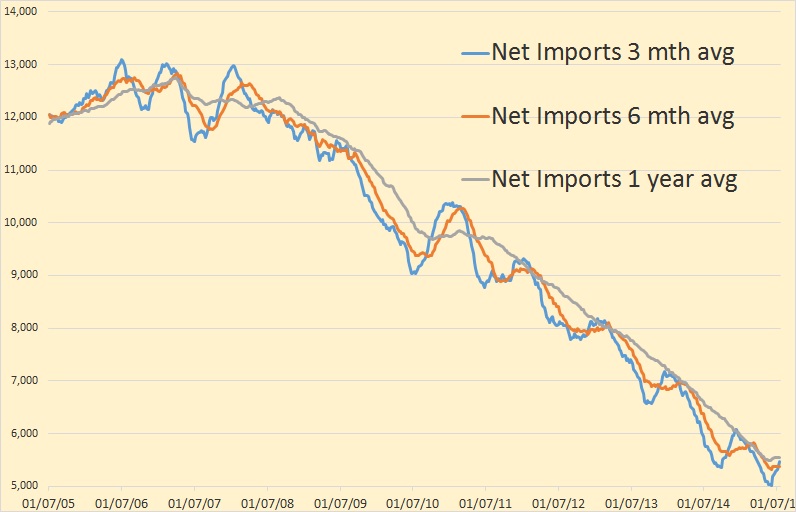
Even before the shale revolution got underway, US net imports were falling. The data below is from the Weekly Petroleum Status Report and is in thousand barrels per day.
This chart shows net crude oil and petroleum products imports. Net imports peaked in 2006 and started to fall in earnest in 2008. They continued to fall until 2010 when the three month average increased sharply and the annual average leveled out for about a year. Then as the Light Tight Oil revolution got underway in 2011, net imports started to fall again.
The chart above shows net imports bottom out in late spring, March and April and heads back down again in June. Below is the last year of that chart amplified.
But in December of 2014 net imports broke their trend and headed sharply up, about four months earlier than normal. Much of this increase in imports had to be caused by declining US production though part of it could be caused by increased consumption because of low prices.
The EIA’s Petroleum Supply Monthly is out with US and individual states production numbers for November 2014. Below are some charts from that data. The data is in thousand barrels per day with the last data point November 2014.
US, down 31 kbd to 9,020,000 bpd. This is the first time the US has had a monthly decline that wasn’t blamed on a weather event in quite a while.
Texas, up 48 kbd to 3,403,000 bpd. Because of Texas’s reporting procedures the EIA has to guess at their oil and gas production. And their guess is that Texas oil production is behaving as if oil were still $100 a barrel. I believe there will be some big revisions in this data in a few months.
North Dakota, up 3 kbd to 1,187,000 bpd. At least they get North Dakota right.
Alaska, up 17 kbd to 517,000 bpd. Alaska always bottoms out in August, for summer maintenance, and peaks in December. The spike down in January 2011 was due to the pipeline leak and had to shut down for several days
GOM, down 62 kbd to 1,383,000 bpd. They had expected a lot more out of the Gulf of Mexico by now. The EIA predicted 2 million barrels per day from the GOM by 2016. I just don’t think that is going to happen
Below is a short essay by Tom Giesen a Natural Resource Policy instructor at the University of Oregon. He calls it: A Primer on the Oil Situation
Oil has been relatively inexpensive, energy intensive, portable, relatively safe, convertible to myriad uses – an incredibly useful substance, especially in regard to transportation. In the US, and globally, oil powers virtually all movement of people and goods, and is the source of many products. It appears to many people to be essential.
Oil comes in at least these categories:
- Conventional oil: vertically drilled wells on land or shallow continental shelf. Conventional oil, worldwide, is past its peak of production (it peaked in 2005-8 per the International Energy Agency), and oil production is declining at an average rate of 5.8% per year (Whall and Nelson. Investec. “Global oil supply: the decline rate problem” 2/2014, page 11).
- Unconventional oil comes from oil-laden shale, requiring vertical and horizontal drilling, and also requiring hydraulic fracturing, or “fracking”. It is more expensive to produce than conventional oil. Unconventional oil appears to be in a state of transition. Oil prices were high (~ $100/barrel) from about 2011 to mid-2014. Those high prices supported rapidly expanding new shale oil production, adding nearly 5 million barrels/day of unconventional shale oil to American production, and more than off-setting the worldwide decline in conventional oil.
However, the price of all oil has been dramatically declining (today it is about $45/barrel) – more than a 55% decline – and, in most cases, the price is insufficient to cover shale oil production costs plus profit. Some shale wells are shut in; only very productive shale oil wells will continue to be operated. Conway Mackenzie Inc., a liquidator, predicts large losses in shale oil production-related businesses in the next quarter, especially if prices continue to fall.
Shale oil production has slowed due to low prices. Shale oil operators are cutting the numbers of operating drilling rigs and laying off employees as losses accumulate. Reservations for rail tank cars are off by 30%. Shale wells have a short economically productive life, with the first year typically good, and production then diminishing dramatically by the end of year 2 or 3.
- Tar sands are a mixture of sand and bitumen. Heat is used to separate the bitumen from the sand, and the bitumen is then cut with lighter hydrocarbons and refined to be similar to crude oil. It is generally more expensive than shale oil to produce, but much of the cost is related to building the initial plant. It seems likely that on-going production will be continued for a time as all but operating costs were covered in the initial investment. Production is relatively small.
- Ultra-deep oceanic wells are expensive and high risk. For example, the Macondo well in the Gulf of Mexico, which blew out, was a major ecological/financial disaster for BP. However, some deep drilling is continuing. Arctic drilling has not been successful and instead has caused huge losses for Shell.
The long decline in oil prices from July 2014 to the present has several causes. Due to faltering major economies (e.g., EU, Japan, Russia, and a slowing of growth in China), the demand for oil diminished. At the same time, American shale oil production was booming. The result was abundant oil in a depressed market for oil, and those circumstances led to a long tumble in oil prices, which may continue. Many enterprises, profitable at $100/bbl., were unable to continue at substantially lower oil prices.
The extent of fracking is declining for economic reasons. However, the only because Richard Cheney, VP under President George W. Bush, pushed through laws in 2005 which exempted oil and gas production from these existing laws:
Clean Air Act, Clean Water Act, Safe Drinking Water Act,
National Environmental Policy Act, Resource Conservation and
Recovery Act, Emergency Planning and Community Right-to-Know
Act, the Superfund act, and from various toxic reporting requirements
(Source Exemptions for hydraulic fracturing under United States federal law
Without those exemptions, fracking would not have been possible.
Fracking is horribly polluting via many carcinogenic agents (e.g., benzene and formaldehyde) and a laundry list of other toxics. Fracking sites are not monitored for environmental degradation, as they are exempt from regulation.
Fracking is also water-intensive, using an average of about 20 million gallons of water (plus as many as 50 different chemical additives) per well. The water – now more toxic – must be removed from the well and disposed of safely – though there are no known purification processes.
People who live and work near fracking sites are often chronically ill from the fumes, and families are often unable to sell and move – most people these days won’t buy a home near a fracked well because of toxics, so families essentially become prisoners in their homes.
That we permit fracking is testimony that, as a nation, we value using shale oil more than we value protecting our families from living and working in extremely toxic/carcinogenic conditions.
—
To summarize, production of conventional oil is declining at 5.8%/year (about 5.3 million barrels a day). Unconventional oil is declining because the current price of oil is too low in most cases to make fracking profitable. Tar sands oil may continue for a time – but future projects are on hold. Ultra-deep wells and Arctic sources are risky and expensive relative to current prices.
The global production of oil is declining.
—
Oil, unlike sunlight, is available only in finite quantities, and the flow of oil is diminishing. Oil, like coal and natural gas, produces carbon dioxide when burned; CO2 is a greenhouse gas, and is the major cause of global warming. The decline in oil production is a clarion call for renewable energy. We need the remaining oil to create the infrastructure for a base flow of renewable energy.
Our future is in renewable energy sources, not fossil fuels.
Tom Giesen is an Adjunct Instructor in Planning Public Policy and Management at the University of Oregon, teaching Natural Resource Policy.
14 Comments on "US Production and Imports"


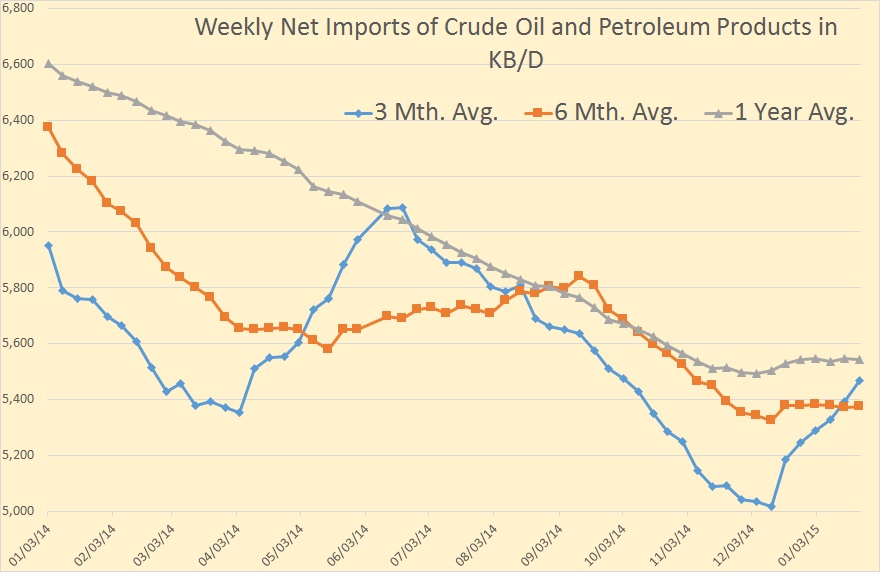
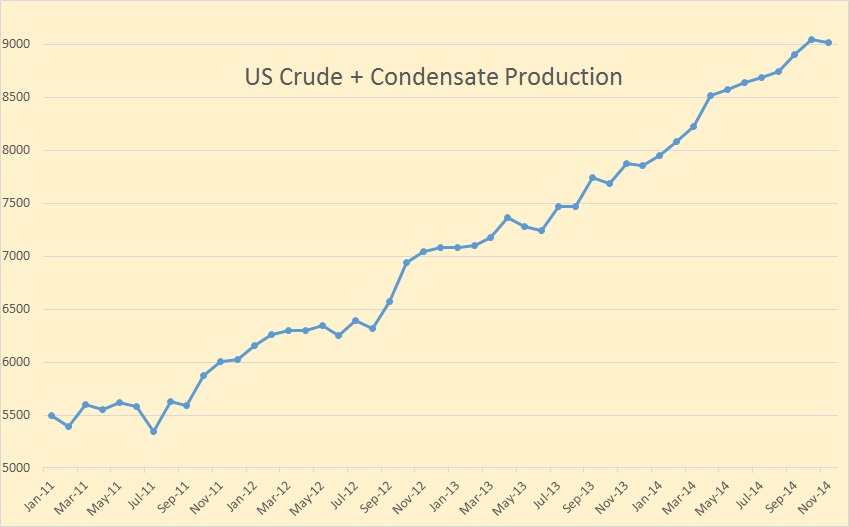

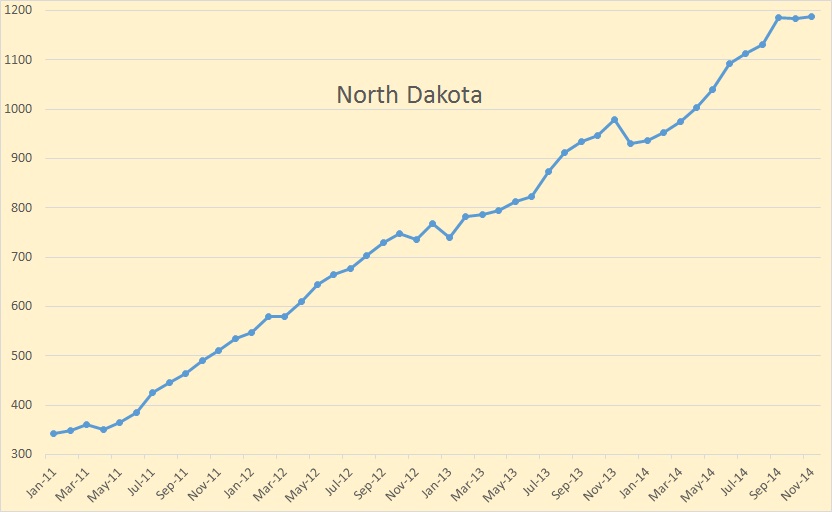

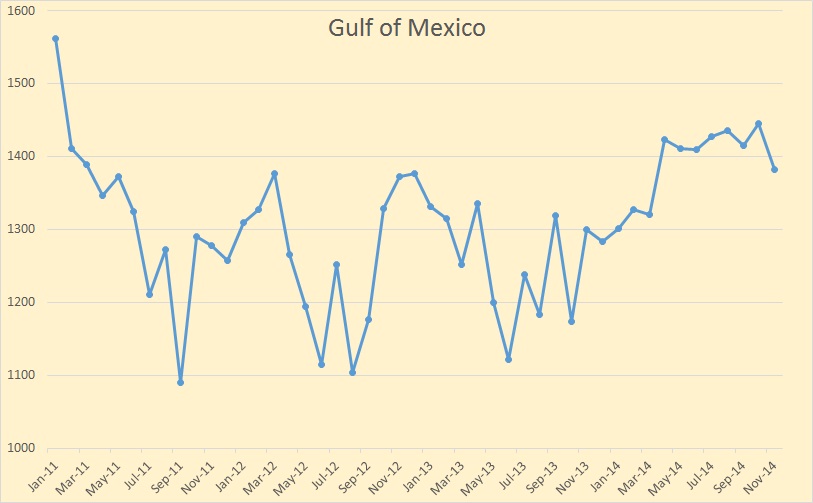
Plantagenet on Thu, 29th Jan 2015 4:58 pm
Tom Geisen rightly gives Dick Cheny credit for the US fracking industry, even though obama has been claiming that he is responsible for the success of fracking and lower US gasoline prices. Of course obama deserves some credit for going along with prior Bush-Cheney policies.
Davy on Thu, 29th Jan 2015 7:31 pm
Planter you best thank Hank P and helicopter Ben. They pumped up the capital markets for the fracking gold rush. Cheny is a numb nut that succeeded in ending the U.S. global dominance in a monkey trap called Iraq. The guy is a friggen thief and liar.
Plantagenet on Thu, 29th Jan 2015 7:53 pm
So you think obama deserves credit for all the fracking of oil rather than dick cheney?
Nah. The person who gets it going gets the credit.
Cheers!
Davy on Thu, 29th Jan 2015 8:02 pm
Planter, I am trying to figure out where Obama fit into my comment. Only you would know.
Makati1 on Thu, 29th Jan 2015 8:22 pm
“Our future is in renewable energy sources, not fossil fuels.”
He did not qualify that statement but maybe he meant sunlight on plants and muscle power? If so, he would be correct. If he meant solar panels and huge wind towers he is wrong. Water/wind can be used for small scale milling or powering small blast furnaces, but nothing large scale.
Solar water heating is possible but most of the normal components require high hydrocarbon energy to get from mines to finished product. Ditto for solar/wind electric. Few think out ENTIRE systems when considering ‘renewables’.
Makati1 on Thu, 29th Jan 2015 9:10 pm
News of “renewables”…
Italy to halt solar power sector incentives -deputy industry minister
http://www.reuters.com/article/2015/01/26/italy-energy-incentives-idUSL6N0V51F320150126
UPDATE 2-SMA Solar to cut 1,600 jobs as European demand slide
http://www.reuters.com/article/2015/01/27/sma-solar-redundancies-idUSL6N0V543F20150127
GregT on Thu, 29th Jan 2015 10:05 pm
Plant said;
“So you think obama deserves credit for all the fracking of oil rather than dick cheney?”
Obama does not deserve any blame for the fracking fiasco Plant, it is Cheney that should go directly to jail, and the Bushes too.
GregT on Thu, 29th Jan 2015 10:07 pm
Davy said,
“Planter, I am trying to figure out where Obama fit into my comment.”
Obama is automatically assumed Davy, along with ‘the oil glut’.
Plantagenet on Fri, 30th Jan 2015 12:51 am
So in your imaginary world there is no oil glut?
Pray tell— How else does it differ from the real world?
Hahahahahahahahahaah!
Cheers!
Northwest Resident on Fri, 30th Jan 2015 1:42 am
I prefer the phrase “too much oil being produced at a price too high for people to afford” over “oil glut”.
If a company produced “Plantagenet Dart Boards”, for example, with Plant’s ugly mug pictured on the bullseye, they might be able to sell a fair number of them to people IF people had money to buy them at the price they were offered die. But when people have very little spare money if any, and the Plantagenet Dart Boards company just keeps pumping out the dart boards without regard to demand for those dart boards, then they would also end up with a “glut” of unsold dartboards.
As highly sought after as those dartboards would be, and as much as people would like to pepper Plant’s face with darts, if they don’t have the money then they just won’t buy. And if the company just keeps the assembly lines rolling anyway, then they end up with a glut.
The “oil glut” is representative of a very bad economic situation. It is nothing to crow about. Only fools throw that term around as if it had any positive meaning.
steve on Fri, 30th Jan 2015 12:25 pm
Davy said “Cheny is a numb nut that succeeded in ending the U.S. global dominance in a monkey trap called Iraq. The guy is a friggen thief and liar.”
Is he? I think the guy is really smart…that being said I don’t agree with him at all but if you are a devious man in power and you are told that we are approaching or at peak oil….you make a plan to destroy your enemy before he gets on steroids….Saddam was forming alliance with Russia and China and with $100 a barrel of oil and protection from those two countries he could have built a powerful army. You may hate his politics but Dick is a smart man…He succeeded in doing exactly what he wanted to do destabilize the oil rich countries. I think some people on here think that they are the only ones who have a front row seat to what is going on but don’t bet on it…we are only seeing half of what is going on when the tide goes out we will see all if we are still alive. Just look back at history most people could not see the major catastrophes going on..
GregT on Fri, 30th Jan 2015 12:39 pm
Dick Cheney is nothing more than a murderer and a corporate criminal. He should be tried in an international court for crimes against humanity. There were plenty of opportunities to take Saddam out, without killing hundreds of thousands of innocent people, and bombing an entire country back into the stone age. The people of Iraq have front row seats, they are very aware of the other half of what is going on, that so many of us here don’t want to see.
Poordogabone on Fri, 30th Jan 2015 6:08 pm
For now criminal courts don’t hold any weight against american mass murderers.
Look at our beloved Kissinger. Let’s keep hoping. Precedents needs to be set.
The only satisfaction that I get is that these vile old men can hardly travel abroad.
Poordogabone on Fri, 30th Jan 2015 6:09 pm
For now criminal courts don’t hold any weight against american mass murderers.
Look at our beloved Kissinger. Let’s keep hoping. Precedents need to be set.
The only satisfaction that I get is that these vile old men can hardly travel abroad.